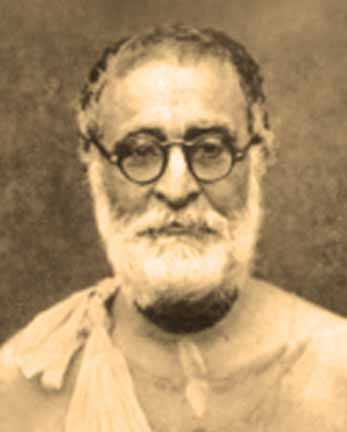śrī śrī guru gaurāṅga jayataḥ!

Year 11, Issue 2
Posted: 6 March 2018
Dedicated to
nitya-līlā praviṣṭa oṁ viṣṇupāda
Śrī Śrīmad Bhakti Prajñāna Keśava Gosvāmī Mahārāja
Inspired by and under the guidance of
Śrī Śrīmad Bhaktivedānta Nārāyaṇa Gosvāmī Mahārāja
Śrī Caitanya’s Grace Leaves No Evil in its Wake
Part 3 of 3

The grace of Śrī Caitanyadeva causes no evil. In His grace, there is no indulgence in karma-kāṇḍa. His endeavour was to induce people to remain aloof from worldly and heavenly enjoyments.
The inner eyes of the people are blinded by the gloom of nescience yet, again, the current of thought cultivated by seekers of jñāna (impersonal knowledge of the absolute) devastates the very principle of opening one’s inner eyes by applying the beautifying ointment of true wisdom. The motto of such seekers of jñāna is: “Guru and I are not separate; guru is not eternal; I shall merge into brahma; etc.”
It is useless to grope in the dark, attempting and failing to grasp any clue about Reality. Those who have carefully studied the ślokas of Śrīmad-Bhāgavatam, such as the ones presented in the following passages, know very well that one who follows the māyāvāda current of thought shall certainly be disappointed in the long run and permanently remain steeped in ignorance. Persons who hanker for emancipation and adopt duplicity for that end waste time in henotheism (adherence to one god out of several, especially by a family, tribe, or other group) and, by becoming impersonalists, they destroy their own entity. Even the conception of guru is lost to them. Śrī Caitanya Mahāprabhu has solved the problem of such contradictory positions.
The ślokas referred to previously are as follows:
(i) Śrīmad-Bhāgavatam 10.14.3–4:
Śrī Brahmā said to Śrī Kṛṣṇa, “O Lord, those who spend their lifetime listening to accounts of Your glories emanating from the mouths of true saints and bow low in obeisance, and who give up all attempts to acquire any jñāna leading to emancipation – they bring You under their control, although you are invincible in all other ways. But those who give up bhakti to You, which is the only way to true well-being, only gain troubles as their reward, for comprehending oneness with God is as troublesome as trying to produce grains by thrashing empty husks.”
(ii) Śrīmad-Bhāgavatam 10.2.32:
Śrī Brahmā and the other gods, along with all the great sages, said to Śrī Kṛṣṇa, “O Lord, those who think themselves emancipated and shake off devotion to You have impure intellect. They endure a complete downfall from their high position, which was acquired with immense difficulty, for they disregard the only shelter – Your lotus feet.”
(iii) Śrīmad-Bhāgavatam 1.5.12:
Śrī Nārada said to Śrī Vyāsadeva, “Even the ability to perceive brahma (absolute spirit) by dint of attaining the highest jñāna, while remaining free from any trace of the dirt of karma, is still not at all praiseworthy...”
Śrī Caitanya Mahāprabhu has given man the true cid-rasa (the transcendent, fully cognizant flavour of sweetness) and made him experience its difference from jaḍa-rasa (the mundane flavours of this material world). He has thereby set to rest all contending principles, which have their origins in man’s attempt to understand in the inductive way the transcendent entities that descend into this region of māyā, or the world.
Mahāprabhu’s grace has ever been giving us attachment to God with a tendency for offering Him service. His grace brings us real peace, which has been defined by God Himself as a result of fixing the mind with steadiness in Him (Śrīmad-Bhāgavatam 11.1.36). He has also said to Śrī Brahmā: “That jñāna related to Me is the highest, and it is the perfectly esoteric mystery (Śrīmad-Bhāgavatam 2.9.33).”*
______________________
* [Bhagavān said to Brahmā:] Before the creation of this world, only I existed. The gross and the subtle, up to the indefinable Brahman – in other words the cause (sat) and the effect (asat) – did not exist. Nothing other than I existed. What is manifested in the form of creation is also I, after creation it is also I, and after annihilation only I will remain.
Among the forms of jñāna – jñāna relating to Bhagavān (God), to Paramātmā (the all-pervading Supersoul) and to brahma (Absolute Spirit) – jñāna relating to Bhagavān is the highest. The other forms of jñāna are lower. There is no jñāna of the distinctive features (viśeṣa) of God in impersonal brahma. There is some awareness of His distinctive features in Paramātmā, but it is without the esoteric element. In jñāna relating to Bhagavān, there are (according to Śrīmad-Bhāgavatam 2.9.32) four differentiations:
jñāna – His svarūpa, or essential nature
vijñāna – His relationship with His potency
rahasya – His relationship with the jīvas
tad-aṅga or jñānaṅga – His relationship with brahma, which, in this context refers to nature consisting of the three guṇas (sattva, rajas and tamas), the first cause of the material world
It is not proper to ascribe the tendency for material enjoyment, which is so prevalent in religion, to devotion to God. The yogīs (who cultivate realization of Paramātmā) are in favour of majesty, and they practice yoga to acquire vibhūti (super-human power). Devotees culture and worship Śrī Kṛṣṇa’s sweetness, and His majesty plays a subservient part. Śrī Caitanyadeva, out of His grace, which generates no evil like other graces, as pointed out by Śrī Svarūpa Dāmodara, has widely propagated these teachings for the highest well-being of mankind. It is the worshippers of Adhokṣaja Kṛṣṇa who can understand all this; the jñānīs have no competence to do so. They are deprived of the power to comprehend the superiority of the tasty sweetness of devotion, or else they are only immaturely ripe in this respect.
This completes the 3 part series.
Adapted from The Gauḍīya, Volume 8, Number 1, Part 3 of 3
by the Rays of The Harmonist Team
![]()





